Transcription
Scott A. Heimermann
200 South Madison Street
P.O. Box 0351
Waupun, Wisconsin 53963-0351
Tel: 920-324-5571
March 29,2013
Ms. Diane M. Fremgen
Clerk of Court of Appeals
110 East Main Street Suite 215
P.O. Box 1688
Madison, Wisconsin 53701-1688
RE: Heimermann v. Walker
Appeal No. 2012AP712
Dear Ms. Fremgen:
Per Wis. Stat. Rule 809.19(10), Plaintiff-Appellant Scott A. Heimermann submits this letter to the Court of the Appeals as additional authority to challenge the circuit court's dismissal of Appellant's newly discovered evidence and having a protected liberty-property interest based on contractual promises in innocence pardon claims, which were preserved in the Appellant's opening and reply briefs. (See Appellant's opening brief at 18-32; Reply brief at 4-11.)
To supplement the matter, Appellant directs the Court of Appeals to the recent authority by Judge Neal Nettesheim, who was presiding over Milwaukee County District Attorney John Chisholm's John Doe investigation against Respondent Governor Scott Walker and his former and current top aides. On February 21, 2013, Judge Nettesheim entered an order to bring closure to Chisholm's lengthy John Doe investigation with instructions that the said order is made public on February 28, 2013. A true and correct copy of Judge Nettesheim's February 21, 2013 order is referenced in a Milwaukee Journal-Sentinel article dated March 2, 2013, which is attached as Exhibit A.
For purposes of the background history pertinent to this supplemental authority, Appellant sought judicial intervention against Governor Walker for unjustly denying his application for an innocence pardon. (R. B: 2, 19.) Appellant wrote in his verified complaint that Governor Walker's executive clemency policies unreasonably deprived him of the substantive consitutional prohibition against incarceration of the factually innocent under the Eighth and Fourteenth Amendments. (R. B: 2,5-6,19.) The characterization of Appellant's constitutional claims stem from a protected property-liberty interest based on contractual promises made by high-ranking exectutive state prison officials to help Appellant obtain an innocence pardon through what he calls "Itinerary of the 'As-Yet-Undisclosed-State-Evidence'", which undisclosed state evidence is still in possession of Chisholm's office and the Milwaukee Police
[Page Break]
Diane M. Fremgen
March 29, 2013
Page Two
Department. (Id.) Additionally, as mentioned in Appellant's verified complaint, this protected liberty-property interest was thwarted based on a scheme of Governor Walker, whereby Governor Walker elevated his own protected life or liberty interests in the outcome of Chisholm's John Doe investigation over that of Appellant's protected life-property interest in an innocence pardon, and from Chisholm's and the Milwaukee Police Department's ongoing refusal to comply with Appellant's requests for the 'Itinerary of the As-Yet-Undisclosed-State-Evidence for purposed of Governor Walker's legitimate decision-making in Appellant's innocence pardon application process. (R.B: 5-6, 8-9, 11-14, 18.)
Again, to his protected property interests, while they arose subsequent to Appellant's 1991 criminal convictions, and are separate from his liberty interests supposedly already adjudicated in his 1991 convictions and sentences, Appellant cited to various United States Supreme Court precedents in his appellate briefs, which stand for the proposition that a prisoner does in fact have a property interest created by state prision officials' contractual promises to obtain an innocence pardon through the 'Itinerary of the As-Yet-Undisclosed-State-Evidence.' (See Appellant's opening brief at 24-32; Reply brief at 4-9.) As Appellant has further written in his motions to reconsideration, his protected property interests created by state prison officials' contractual promises begets his liberty interests in utilizing state clemency proceedings to obtain an innocence pardon through the 'Itinerary of the As-Yet-Undisclosed-State-Evidence'. See D.A.'s Office v. Osborne, 557 U.S. 52, 68, 129 S. Ct. 2308, 174 L. Ed. 2d 38 (2009)(holding that a "state created right can, in some circumstances, beget other rights to proceedings essential to the realization of the parent right"); Skinner v. Switzer, 131 S. Ct. 1289, 1290 (2011)(holding that the state's refusual "to release the biological evidence for testing...deprived [him] of his liberty interests in utilizing state proceedings to obtain...a pardon"). [R. 9:1; 10:2-4; 13:2.]
Additionally, the United States Supreme Court and other federal courts aptly cite the Eighth Amendment for the proposition against continuing the incarceration of a person who is actually innocent. See Bennis v. Michigan, 516 U.S. 442, 466, 116 S. Ct. 994, 134 L. Ed. 2d 68 (1996)("fundamental fairness prohibits the punishment of innocent people")(Stevens, J., dissenting); and Souliotes v. Evans, 622 F. 3d 1173, 1183 n. 3(9th Cir. 2010)(recognizing that "continuing to incarcerate the 'actually innocent' is just as violative of the Eighth Amendment as executing them")(Zilly, J., concurring)(quoting In Re Davis, 2010 U.S. Dist. LEXIS 87340, at 104, 217 (S.D. Ga. 2010)(applying Supreme Court precedents in a noncaptical case under Eighth Amendment standard).
Appellant stated in his application for an innocence pardon that Wisconsin's clemency process is the only means by which he has available to challenge his outstanding convictions on the ground of factual innocence because the state and federal judicial
[Page Break]
Diane M. Fremgen
March 29, 2013
Page Three
process has been completely exhausted in his case. (R.B:28.) [1] See Herrera v. Collins, 506 U.S. 390, 411-415, 113 S. Ct. 853, 122 L. Ed. 2d 203 (1991)(recognizing the traditional availability and significances of clemency as part of executive authority, especially for "preventing miscarriage of justice where judicial process has been exhausted"). It is confirmed by the 'Itinerary of the As-Yet-Undisclosed-State-Evidence' that Appellant did not help to kill anyone regarding the August 19, 1989 homicides of Muhammad Binwalee and Dion Russell. Al he did was survive in light of the constant bullying tactics used at the time by the Milwaukee Police Department ("MPD"). The bullying force of the MPD had a lot to do as to why Appellant was a bystander at the scene of the crime and witnessed the murders. The MPD was there, too. They knew about the murders in real time. They saw what Appellant saw, but Milwaukee police did not intervene, even though Appellant in fact contacted the MPD just weeks before Binwalee and Russell were gunned down by Edward J. Piscitello and Joseph Isajiw to warn of Piscitello's regular violent tendencies.
But the Appellant was blown off. This is because the 'Itinerary o fthe As-Yet-Undisclosed-State-Evidence' also confirms that an ongoing relationship consisted of Piscitello and the MPD. Piscitello was a long-standing informant for the MPD since the 1970s. That relationship had a physically force on Appellant actually being at the scene and witnessing the murders. This turned on the MPD and Piscitello pushing an agenda throughout 1989 to track a drugs and guns smuggling operation against Binwalee and his affiliates in the Black Gangster Disciples organization instead of confiscating the drugs and guns. This botched drugs-for-guns investigations along with MPD's failure to pay attention to Appellant's late July 1989 phone call about Piscitello's ongoing violent tendencies is what essentially caused the August 19, 1989 murders of Binwalee and Russell of which Appellant was unjustly convicted in 1991. (See Appellant's opening brief at 13-16; reply brief at 9-11.) Thus, Chisholm's office could not launch a criminal case against Appellant without first disclosing the 'Itinerary of the As-Yet-Undisclosed-State-Evidence' to a jury, where such disclosure would have undermined anything the MPD had to say about Appellant and impeded any successful prosecution of Appellant for the murders of Binwalee and Russell.
The fundamentals of the 'Itinerary of the As-Yet-Undisclosed-State-Evidence' is simple: In "The Dog That Doesn't Bark" novel of Sherlock Holmes, the fictitious detective with atypical powers of deduction, it reflects the continuing stone silence by Chisholm's office and the MPD in their response to Appellant's negative (but truthful) submissions of
_________________________________________
[footnote 1] As summarized by the Court of Appeals in Heimermann v. McCaughtry, et al., 2009 WI App 21,2008 Wisc. App. LEXIS 1005 (Ct. App., Dec. 18, 2009)(upublished), Appellant has "repeatedly attempted to challenge his conviction, both directly and indirectly," having "filed approximately thirty-nine appeals and writs in [the Wisconsin Court of Appeals] since 1991." Id. at paragraph 3.
[Page Break]
Diane M. Fremgen
March 29, 2013
Page Four
cover-up of Milwaukee police involvement in the noted above drugs-for-guns smuggling and the August 19, 1989 murders of Binwalee and Russell, as well as the deliberate malfeasance of Chisholm's office wrongly charging and convicting Appellant in those murders. And because Governor Walker essentially denied Appellant's innocence pardon for the 'flipping of a coin' to protect his own life or liberty interest in the outcome of Chisholm's John Doe investigation against him, Appellant's ongoing suffering in prison for a crime that he did not in fact commit has been normative for the past two decades. But Chisholm's John Doe sword in fact influenced the option that Governor Walker made in denying Appellant's innocence pardon, which is against state law and the constitution. (See infra.) And so, this reflects the conspiracy of silence by Chisholm's office the MPD to not 'bark' about Appellant's serious submissions against them because they are not only factually true but they cannot be refuted as a matter of fact.
In addition, in his motions to reconsideration the Appellant sought relief from the circuit court's original judgment based on newly discovered evidence. Appellant's newly discovered evidence claim is premised on the contents of a Milwaukee Journal-Sentinel article, dated February 4, 2012, which he did not have access to at the time of the original judgement that was entered December 16, 2011. (R. 12:5-6.) The article stands for the proposition that Chisholm's John Doe investigation did in fact control the outcome of Appellant's innocence pardon action because Governor Walker could not argue that he did not have any life or liberty interests in denying Appellant's innocence pardon to which the article now confirms. The article bears out that Governor retained two high-profile criminal defense attorneys - Michael Steinle of Milwaukee and John Gallo of Chicago - to protect his own continuing protected life or liberty interests from Chisholm's unending John Doe investigation against him. (R. 12:5-6.) [2]
Just as Appellant had a continuing protected interest in the innocence pardon process, so Governor Walker had a continuing protected life or liberty interest in the outcome of Chisholm's never-ending John Doe investigation who's office is in fact the very focus of Appellant's innocence pardon process. Afraid, terrified at what's coming next, afraid of the unknown because of the various arrests and convictions of Governor Walker's current and former top aides already coming out of Chisholm's John Doe investigation Governor Walker had witnessed. (R. 12:5-6.) These are all products of Chisholm's long-running John Doe investigation that influenced Governor Walker from any legitimate decision-making in Appellant's innocence pardon process. As Justice O'Connor explained in her concurring opinion in Ohio Adult Parole Auth. v. Woodard, 523 U.S. 272, 118 S. Ct. 1244, 140 L. Ed. 2d 387 (1998), "[j]udicial intervention might, for example be warranted in the face of a scheme whereby a state official 'flipped a coin' to determine whether to grant clemency, or in a case where the state arbitrarily denied a prisoner any access to its
_________________________________________________
[footnote 2] Note: These attorneys were paid some $200,000 from Governor Walker himself to which proves that Walker in fact had a protected life or liberty interest in the outcome of Chisholm's John Doe investigation.
[Page Break]
Diane M. Fremgen
March 29, 2013
Page Five
clemency process." (Id. at 289). Thus, where Governor Walker's decision-making in Appellant's innocence pardon application process is in fact nothing more than simply 'flipping a coin' on account of the political influence from Chisholm's John Doe investigation whereby Governor Walker chose to protect his own life or liberty interests instead of properly adjudicate Appellant's liberty-property interests to obtain an innocence pardon, Appellant could not count on Governor Walker providing even minimal due process or legitimate decision-making to order Chisholm to release the 'Itinerary of the As-Yet-Undisclosed-State-Evidence' Appellant appropriately deserves for Governor Walker to grant an innocence pardon based on Appellant's factual innocence.
The Appellant is accordingly worse off than he was before. The Appellant's protected liberty-property interests had not been afforded due process in the innocence pardon application process. The factual innocence of the Appellant mandated by the substantive constitutional prohibition against incarcerating the factually innocent does in fact support Appellant's argument for judicial intervention for compelling Governor Walker to properly adjudicate Appellant's innocence pardon.
For these reasons, Appellant's submission of Judge Nettesheim's February 21, 2013 order to close Chisholm's prolonged John Doe investigation not only exonerates Governor Walker but gives a big green light to Governor Walker to now do the right thing and move forward to exonerate Appellant based on what state law and the constitution says that he has a right to (that is, an innocence pardon through ordering the immediate release of the 'Itinerary of the As-Yet-Undisclosed-State-Evidence' still in possesion of Chisholm's office and the MPD).
In sum, the Court of Appeals should reverse and remand to allow the circuit court to fully address Appellant's detailed claims on their merits. The order of Judge Nettesheim, like a strong wind, has magnificently cleared the air, freeing Governor Walker from a drawn out time of political tyranny at the hands of Chisholm. This remand will now permit Governor Walker to freely exercise his powers and duties as governor in Appellant's innocence pardon proceeding by this Court's intervention to compel Governor Walker to do things right to work justice on the basis of Governor Walker ordering Chisholm and the Milwaukee police chief to speed up the release of the 'Itinerary of the As-Yet-Undisclosed-State-Evidence' for Appellant's innocence pardon application process, and to grant the innocence pardon of Appellant for his factual innocence in the August 19, 1989 murders of Muhammad Binwalee and Dion Russell, with Governor Walker realizing there's nothing to be afraid from Chisholm's John Doe investigation being a political influence in this case anymore.
[Page Break]
Diane M. Fremgen
March 29, 2013
Page Six
I therefore submit this supplemental authority to the Court of Appeals for purposes of this appeal. I am sending a copy of this letter by first class mail to the Respondent's counsel of record, Assistant Attorney General Abigail Potts, including Governor Walker's Assistant Legal Counsel Karley Downing who is overseeing Appellant's innocence pardon application process.
In the meantime, I have attached to this supplemental authority a copy of Appellant's December 26, 2012 letter addressed to Assistant Legal Counsel Karley Downing, for the Court's review in this matter.
Thank you for the Court's consideration.
Sincerely,
[Signature]
Scott A. Heimermann
Enclosures (3)
c w/encl.: AAG Abigail Potts
Attorney Karley Downing
Other posts by this author
|
2016 jun 6
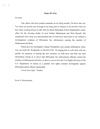
|
2016 feb 26

|
2016 feb 13
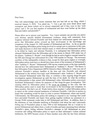
|
2016 feb 8
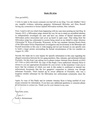
|
2014 dec 22
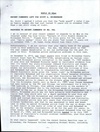
|
2014 feb 27
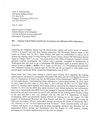
|
More... |

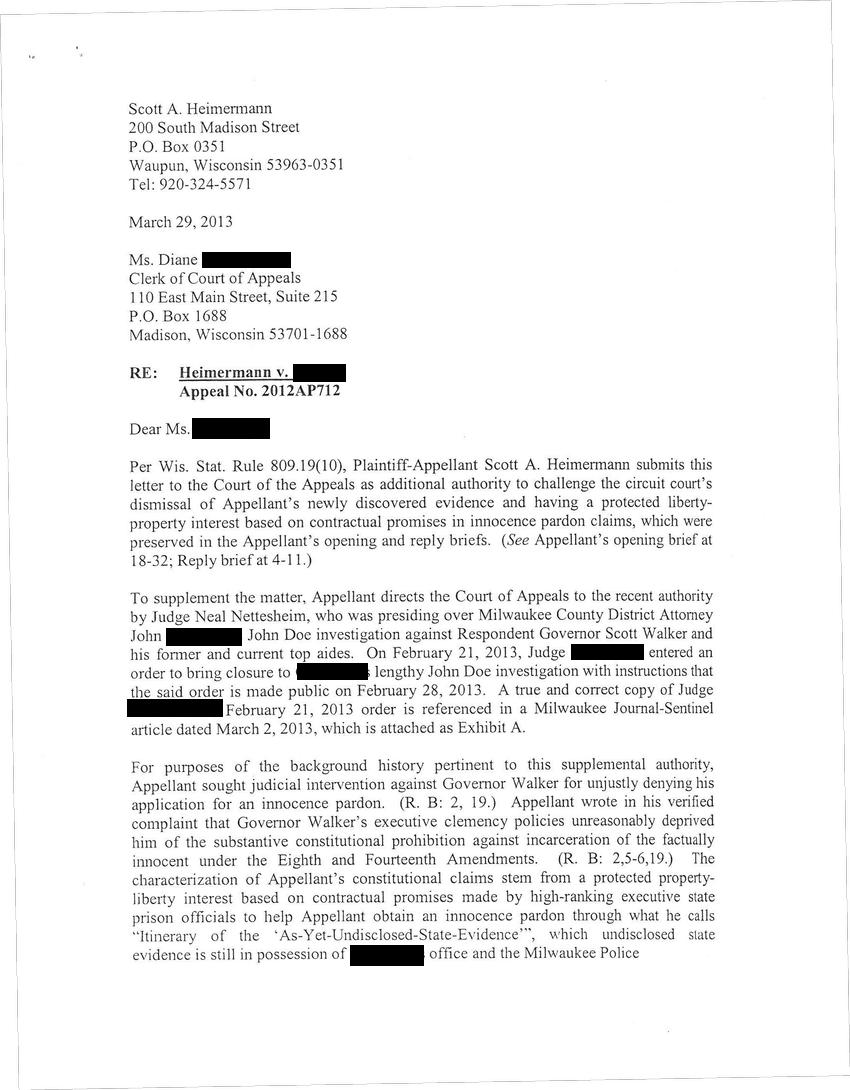
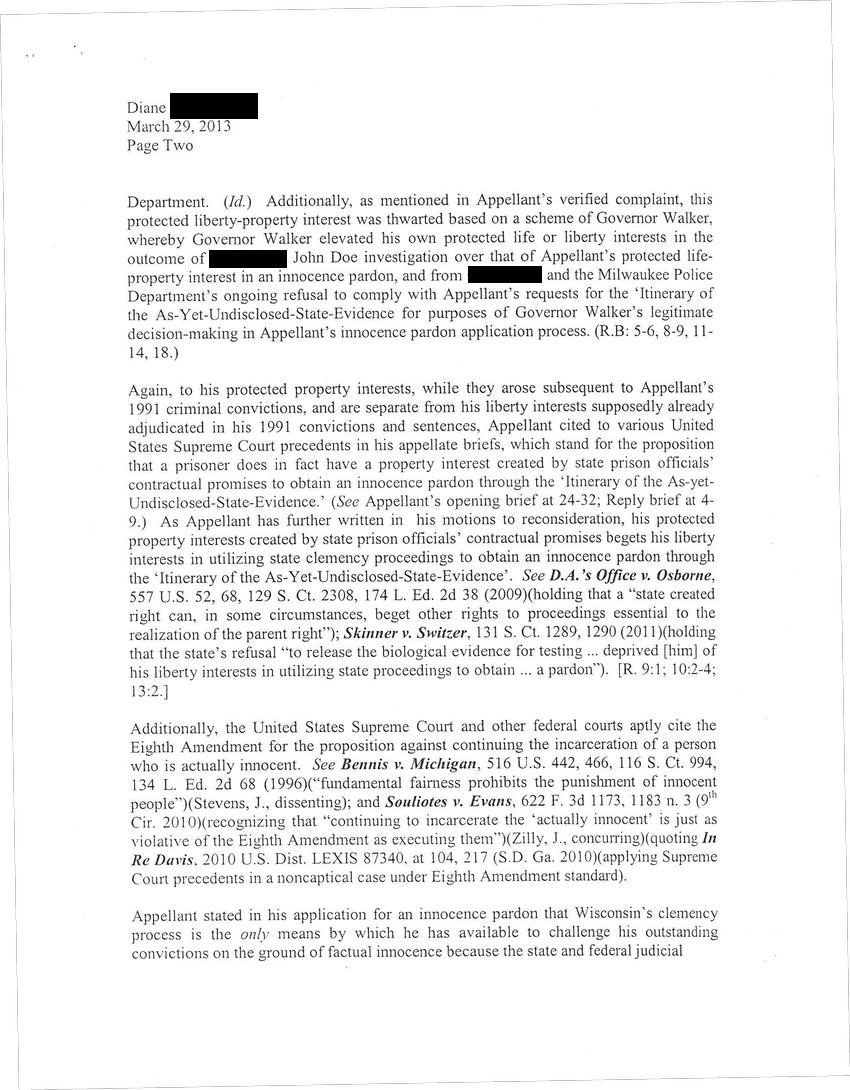
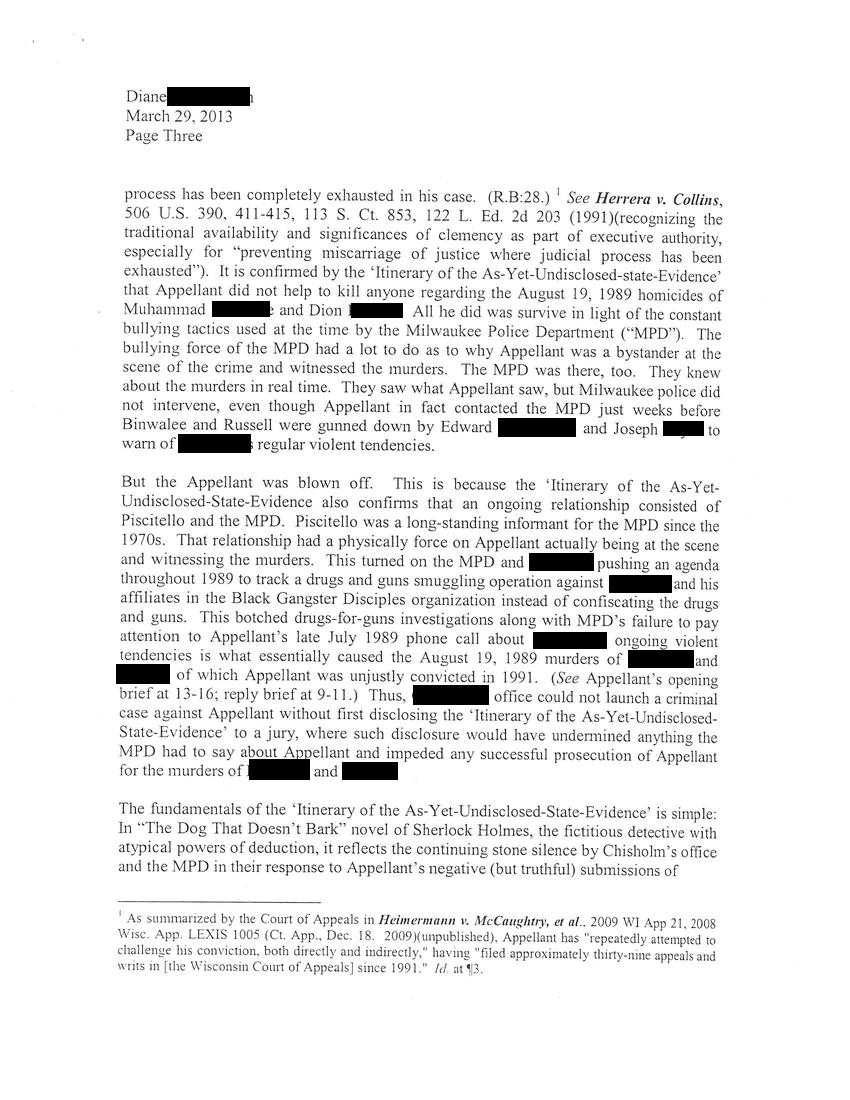
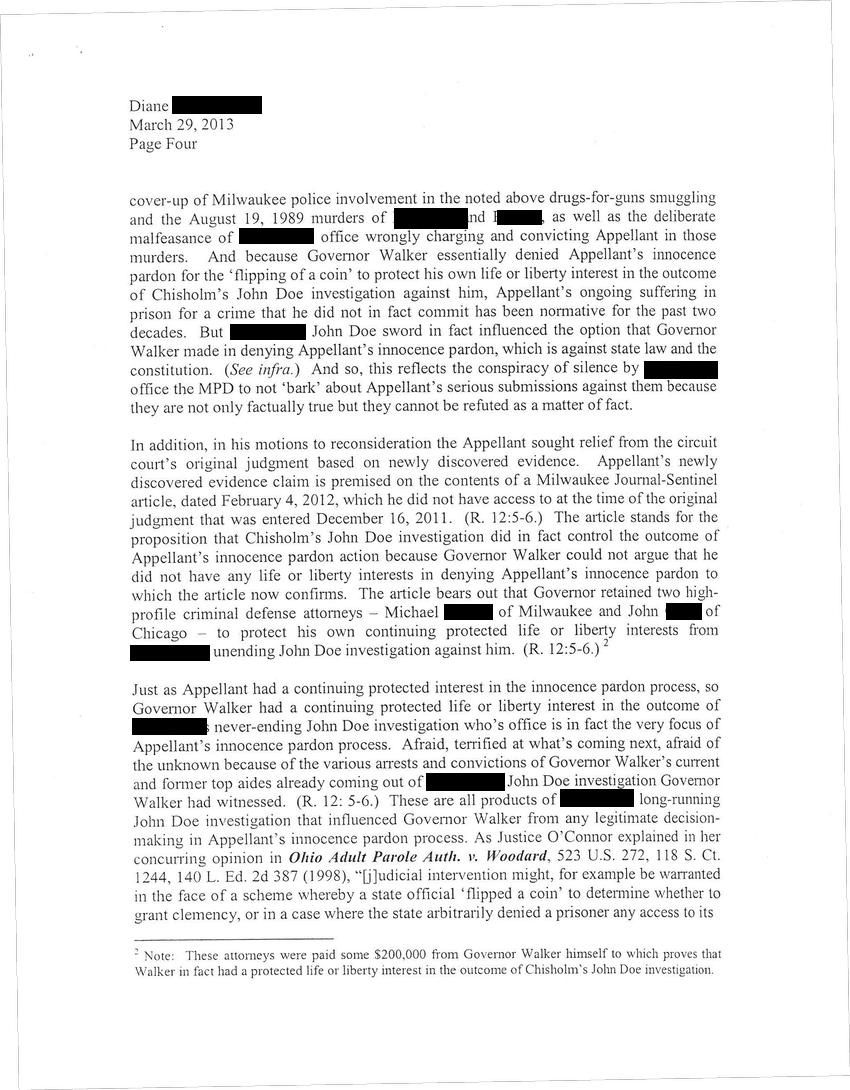
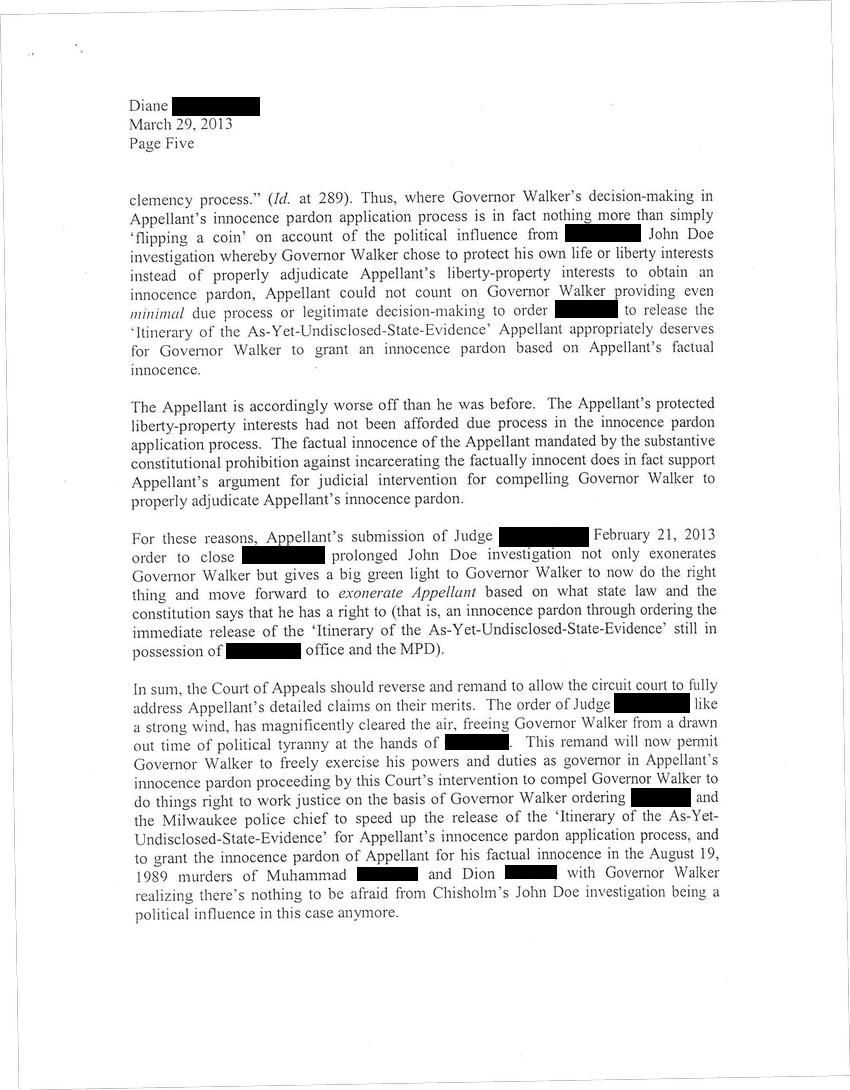
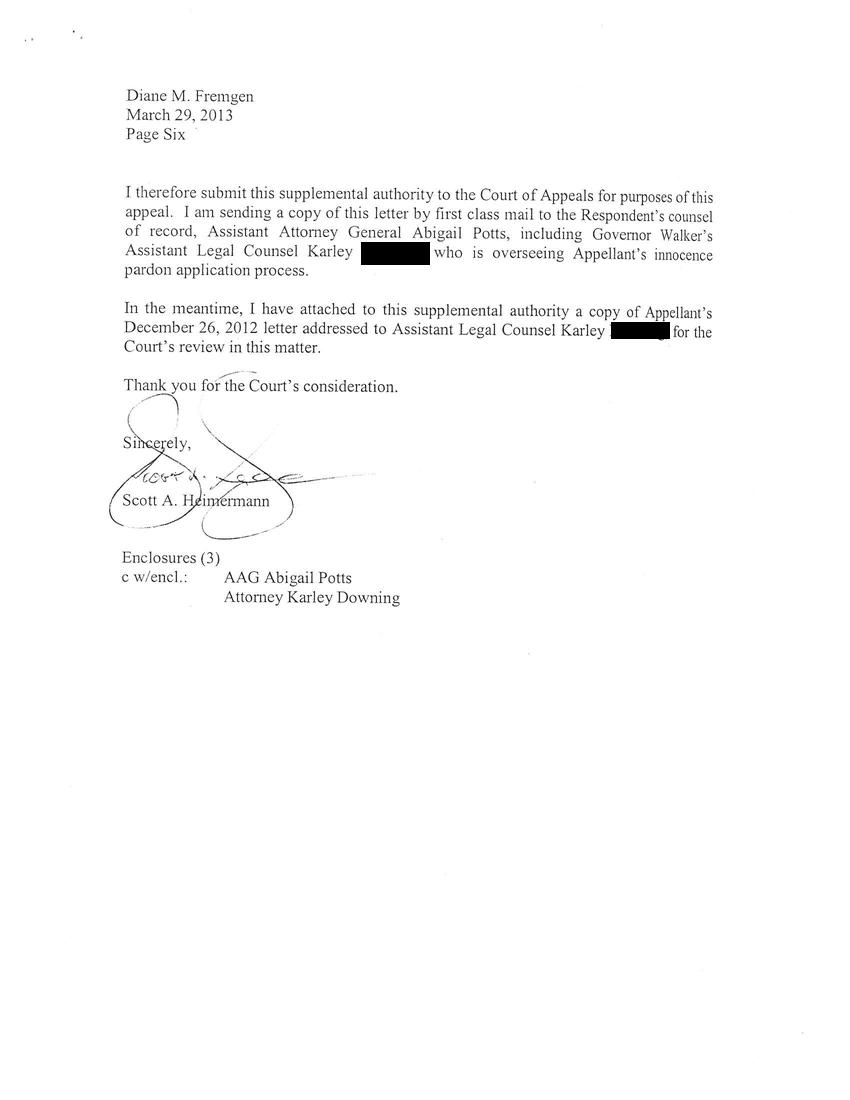

Replies